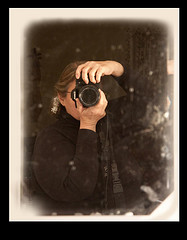150 or so technology teachers gather once a month for a meeting … an old fashioned, analog, meeting.
Announcers announce announcements (which were sent out in email beforehand). Managers manage. Specialists present their specialities. Pointers point at points with pointers. Counterpoints are made. Facsimiles of discussions are had.
Askers ask questions. But in the active engagement of an analog meeting, many times no answers are available. “That’s a great question, and I’ll look into it, and get back to you.”
Days later, a singular answer is delivered to a singular asker. But we all did get to hear the question posed, and that is certainly something. But what? I don’t know, I’ll have to look into it and get back to you.
One of my cohorts, a jocular and intelligent fellow, posed the idea of USING the technology we are teaching to somehow facilitate the meeting. “It has to be better than sitting around a table while people shamelessly check their email and rudely interrupt the presenter?” he said.
Heresy you say? Perhaps. But if one believes less in a religion that worships the gods, than in one that feels sorry for them. (I mean, they created all this, and can’t possibly feel good about it.) One might venture to noodle on such a concept.

BUILD A MEETING:
A little like ‘build a bear’ shops found in malls across the country, there should be some structure (or the children wouldn’t be able to start), but enough freedom (so when they are done they feel like a creator).
Here’s one way, using a wiki.
(For those technology teachers among us worried about new technology, see a multitude of wikis done by 2nd graders on wikispaces.com)
1) Create an “Agenda Page” (a central directory page) for the upcoming meeting (perhaps months in advance).
2) Create “Issue Pages” for each item on the agenda. (Hyper-link from the Agenda item to it’s corresponding Issue Page and back to the Agenda page)
3) Anyone involved in the meeting could create an agenda topic and corresponding issue page prior to the meeting.
4) Anyone could add their questions, thoughts, ideas, solutions to issue pages.
The value of this would be as follows. The meeting would be about things of interest to the people attending the meeting. They came up with them. Most of the hard questions and issues would have been hashed out, discussed, answers researched and delivered, all before getting together at the meeting.
The meeting itself would be shorter, more on point, more poignant to the participants.
NOTE TO THOSE ADDICTED TO OUTLOOK PUBLIC FOLDERS FOR GROUP COMMUNICATION:
Pros: You already know how to use this technology.
Cons: Information is not collected, not key-word search-able, information does not get compiled into a group edited document, it is more like confetti–scraps of errant information floating without structure and no good way to search it. Heck even Microsoft is talking about getting rid of this Outlook public folder technology in the next few years.
Solution: Put an RSS feed on the wiki so all changes are sent via email to the outlook public folder at which everyone is used to looking. Remove write privileges for everyone so the only way to “post” in public folders is to add or alter the wiki. Eventually, everyone will start using an RSS reader and the Outlook Public Folders will have no use and go away.
Life After Wiki: Then, all the information collected in the dialog will truly be collected and key-word-search-able available ongoing in a quickly reference-able format for when one needs the information sometime in the future, or not.
This would be using the technology we are trying to get teachers to use in the way we are trying to get them to use it.







